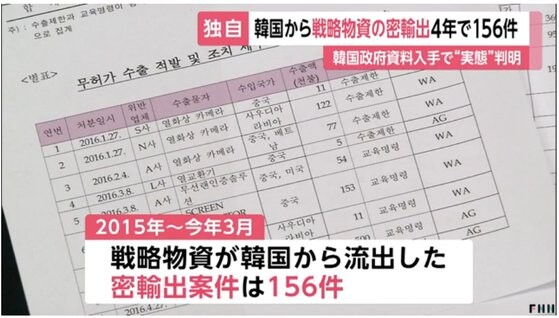hankyoreh
Links to other country sites 다른 나라 사이트 링크
Japan refuses to offer evidence of strategic goods being exported without permission

Despite reports by the Japanese press accusing South Korea of inadequate management of strategic goods, Japan has not been sharing even the number of cases where strategic goods were being exported without permission, in contrast with South Korea’s yearly announcements of such cases to the international community.
Japan’s Fuji TV network reported on July 10 that 156 instances of strategic goods with potential weapon uses being secretly exported had been found in South Korea over the past four years. According to the report, the list of items found included ingredients for the nerve agent VX – used in the assassination of Kim Jong-nam, the half-brother of North Korean leader Kim Jong-un – and hydrofluoric acid that had been smuggled to the United Arab Emirates and elsewhere. The report was accompanied by a commentary from Katsuhisa Furukawa, a former member of the UN Security Council Committee on North Korea Sanctions who said he was “astonished that the South Korean government has not officially announced the discovery of so many cases” and insisted that “this information suggests South Korea cannot be treated as a ‘white list’ country.”
The data mentioned by Fuji TV was confirmed to be the same provided by the Ministry of Trade, Industry and Energy (MOTIE) in May to Cho Won-jin, a lawmaker with the Our Republican Party.
Japan’s use of Korea documents demonstrates opposite of its claims
On the contrary, the data shows that the South Korean government has been transparent about information regarding exports of strategic goods.
“The government shares information annually and in a transparent manner on instances where strategic goods are found being exported without permission and the response measures taken through annual reports by MOTIE’s Korea Strategic Trade Institute (KOSTI), and it periodically provides detailed particulars to the National Assembly through parliamentary audits,” a MOTIE senior official said.
“This proves that South Korea’s management system for the exportation of strategic goods is operating in an effective and transparent way,” the official explained.
The US similarly announces cases on a yearly basis. In 2017, the Department of Commerce’s Bureau of Industry and Security (BIS) announced 31 cases of criminal punishment and 52 of administrative punishment for illegal exportation. Yet Japan only announced a selected few of the cases found and does not share the number of cases of illegal exports.
South Korean businesses expressed bafflement over the Japanese media’s report.
“It is utterly absurd to suggest that Samsung Electronics or SK Hynix would be passing hydrogen fluoride along to North Korea,” said one industry source.
Chemistry experts called Japan’s claims “farfetched,” noting that while chemical weapons like sarin gas could be produced in theory with etching gas, it could also be done with low-purity hydrofluoric acid, obviating any need to use expensive Japanese-produced etching gas.
By Choi Ha-yan, staff reporter
Please direct comments or questions to [english@hani.co.kr]

Editorial・opinion
![[Guest essay] Preventing Korean Peninsula from becoming front line of new cold war [Guest essay] Preventing Korean Peninsula from becoming front line of new cold war](https://flexible.img.hani.co.kr/flexible/normal/500/300/imgdb/original/2024/0507/7217150679227807.jpg) [Guest essay] Preventing Korean Peninsula from becoming front line of new cold war
[Guest essay] Preventing Korean Peninsula from becoming front line of new cold war![[Column] The state is back — but is it in business? [Column] The state is back — but is it in business?](https://flexible.img.hani.co.kr/flexible/normal/500/300/imgdb/original/2024/0506/8217149564092725.jpg) [Column] The state is back — but is it in business?
[Column] The state is back — but is it in business?- [Column] Life on our Trisolaris
- [Editorial] Penalties for airing allegations against Korea’s first lady endanger free press
- [Editorial] Yoon must halt procurement of SM-3 interceptor missiles
- [Guest essay] Maybe Korea’s rapid population decline is an opportunity, not a crisis
- [Column] Can Yoon steer diplomacy with Russia, China back on track?
- [Column] Season 2 of special prosecutor probe may be coming to Korea soon
- [Column] Park Geun-hye déjà vu in Yoon Suk-yeol
- [Editorial] New weight of N. Korea’s nuclear threats makes dialogue all the more urgent
Most viewed articles
- 1Behind-the-times gender change regulations leave trans Koreans in the lurch
- 2South Korean ambassador attends Putin’s inauguration as US and others boycott
- 3Yoon’s revival of civil affairs senior secretary criticized as shield against judicial scrutiny
- 4Family that exposed military cover-up of loved one’s death reflect on Marine’s death
- 5AI is catching up with humans at a ‘shocking’ rate
- 6[Guest essay] Preventing Korean Peninsula from becoming front line of new cold war
- 7Yoon’s broken-compass diplomacy is steering Korea into serving US, Japanese interests
- 8Japan says its directives were aimed at increasing Line’s security, not pushing Naver buyout
- 91 in 10 marriages in Korea last year was with a foreign national
- 10[Editorial] New weight of N. Korea’s nuclear threats makes dialogue all the more urgent